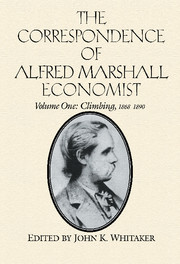Alfred Marshall: A Sketch
Published online by Cambridge University Press: 29 March 2010
Summary
Alfred Marshall was born on 26 July 1842 in the London suburb of Bermondsey into a comfortable lower middle class home, his father, William Marshall, being a clerk (later cashier) at the Bank of England. The family subsequently moved to the suburb of Clapham where most of Alfred's boyhood was spent. His father was a stern taskmaster, but Alfred's youth seems to have been moderately happy. He was educated at the Merchant Taylors' School, a venerable London day school, revealing an acute mind and a particular aptitude for mathematics—a predilection his father discouraged. But with a loan from an Australian uncle and an open exhibition to St John's College, Cambridge, Marshall entered Cambridge University in 1862, preparing for the Mathematical Tripos, the University's most prestigious degree examination. He emerged in 1865 in the distinguished position of Second Wrangler, topped only by the future Lord Rayleigh, a result ensuring Marshall's election to a Fellowship at his College. In 1868 he was also appointed as Lecturer in Moral Sciences at St John's, his interests having meanwhile drifted from mathematics and physics towards a concern for the philosophical and moral foundations of human behaviour and social organization. Henry Sidgwick and William Kingdom Clifford were important influences among his intimates, while a heady if perplexing infusion of German idealism and Darwinian evolutionism, the ideas of Kant, Hegel, and Spencer especially, leavened the pragmatic British utilitarian tradition that he derived through John Stuart Mill and Sidgwick. Marshall was always to be strongly influenced by idealist and evolutionist ideas, although he never quite managed to reconcile them with the dominant British tradition.
- Type
- Chapter
- Information
- The Correspondence of Alfred Marshall, Economist , pp. xvii - xxiiiPublisher: Cambridge University PressPrint publication year: 1996
- 1
- Cited by

